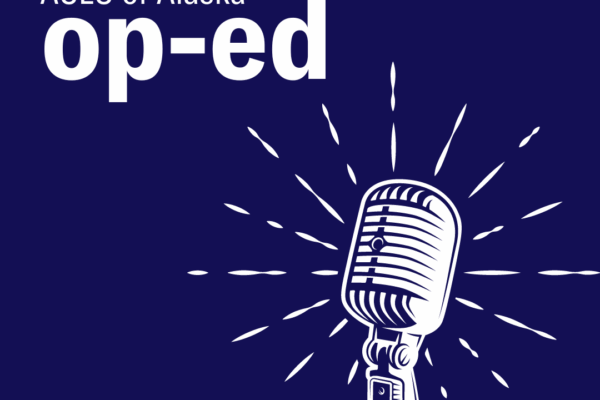The following was published as an opinion editorial by Kevin McGee, ACLU of Alaska Board Member, in the Anchorage Daily News on June 1, 2024. The original piece can be found here.
Two of the most important bills in the legislature this year — education funding and voting rights — passed the bipartisan state Senate overwhelmingly but failed thanks to a single vote by House members.
Opposition to voting rights legislation was particularly baffling — or outrageous — for Reps. Stanley Wright and Thomas Baker, who represent East Anchorage and Kotzebue/Northwest Alaska, respectively. Their districts are majority-minority, and de-facto discrimination policies disproportionately affect our districts (I live in East Anchorage). First, a lack of “ballot curing” means that votes cast by the elderly, minorities, and people who speak English as a second language are often discarded due to superficial errors. As Senator Hoffman explained in his floor speech, as much as 15% of votes from rural Alaska are being lost. It is tragic and absurd that our current processes disenfranchise Alaskans whose families have lived here the longest. Just as the lack of ballot curing disenfranchises rural Alaska elders, many of whom speak Yupik or Inupiaq, it disenfranchises urban minorities in Anchorage.
In addition to providing a process for ballot curing, the bipartisan election reform bill would have eliminated the witness signature requirement. There is no need for this in an era with the technology to verify signatures of people who vote by mail, and the lack of witness signatures is one of the primary reasons for discarded ballots.
I appreciate all the senators and representatives who fought hard to pass this important legislation. House members made three attempts to force a simple vote on whether the bill should pass, but majority members, including Reps. Wright and Baker, used procedural tactics to block consideration of the bill in the final hours of this legislative session.
As Martin Luther King Jr. said of voting rights, “The denial of this sacred right is a tragic betrayal of the highest mandates of our democratic traditions.”
Why are some members of the House afraid of counting their constituents’ votes? We should respect and honor the franchise for all citizens. Whatever the color of our skin, whether our first language is English or Inupiaq, voting is foundational for our constitutional rights. There is no legitimate reason to oppose voting rights, and after this year’s election, I hope the Legislature will revisit this voting rights bill.
Kevin D. McGee is past president of Anchorage NAACP Branch 1000, as well as equity officer and board of directors member of ACLU Anchorage.

